Fleurs du Mal Magazine


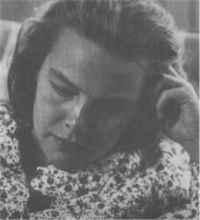
Survivors—Found
We thought that they were gone—
we rarely saw them on our screens—
those everyday Americans
with workaday routines,
and the heroes standing ready—
not glamorous enough—
on days without a tragedy,
we clicked—and turned them off.
We only saw the cynics—
the dropouts, show-offs, snobs—
the right- and left- wing critics:
we saw that they were us.
But with the wounds of Tuesday
when the smoke began to clear,
we rubbed away our stony gaze—
and watched them reappear:
the waitress in the tower,
the broker reading mail,
a pair of window washers,
filling up a final pail,
the husband’s last “I love you”
from the last seat of a plane,
the tourist taking in a view
no one would see again,
the fireman, his eyes ablaze
as he climbed the swaying stairs—
he knew someone might still be saved.
We wondered who it was.
We glimpsed them through the rubble:
the ones who lost their lives,
the heroes’ double burials,
the ones now “left behind,”
the ones who rolled a sleeve up,
the ones in scrubs and masks,
the ones who lifted buckets
filled with stone and grief and ash:
some spoke a different language—
still no one missed a phrase;
the soot had softened every face
of every shade and age—
“the greatest generation” ?—
we wondered where they’d gone—
they hadn’t left directions
how to find our nation-home:
for thirty years we saw few signs,
but now in swirls of dust,
they were alive—they had survived—
we saw that they were us.
Joan Murray
(1917-1942)
Survivors—Found
(poem)
• fleursdumal.nl magazine
More in: Archive M-N, Archive M-N, Joan Murray
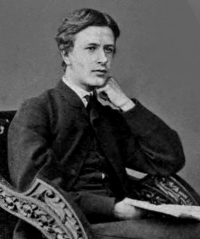
After reading Homer
Happy the man, who on the mountain-side
Bending o’er fern and flowers his basket fills :
Yet he will never know the outline-power,
The awful Whole of the Eternal Hills.
So some there are, who never feel the strength
In thy blind eyes, majestic and complete,
Which conquers those, who motionlessly sit,
O dear divine old Giant, at thy feet.
Digby Mackworth Dolben
(1848 – 1867)
After reading Homer
• fleursdumal.nl magazine
More in: Archive C-D, Archive C-D, Digby Mackworth Dolben
Announcing the 2020 Norma Farber Award winner, Zaina Alsous with A Theory of Birds (Poems)
Aina Alsous is the 2020 recipient of the Poetry Society of America’s Norma Farber Book Award for her book A Theory of Birds (University of Arkansas Press). The Norma Farber Book Award honors a first book of original poetry written by a living author.
 The Judge was Matthew Shenoda. Matthew Shenoda’s Citation: In Zaina Alsous’ A Theory of Birds we are ushered into a re-calibration of the world, one intent on the eradication of that which has been oppressive and divisive. In these poems history unravels us in fragments, causing us to fold ourselves into a new definition of “self” and an unabashed rejection of our positions as “subjects.” The poems found here are an honest and open exploration of how we come into a sense of our own understanding in a postcolonial world. Alsous’ poems are driven by the asking, often posing sentient questions like “who translated kings and not birds?”; questions that cause us to think of redefinition. And while her poems are searing in their critiques of political, racial, and gendered domination, like all good artists she is poignant in her ability to implicate herself at every turn and help us break through the binaries we often use to define ourselves. Hers is an aesthetic of fragmentation as a collective piecing together. A Theory of Birds teaches us that the interior narratives, the often quiet things that make each of us whole, are the most essential.
The Judge was Matthew Shenoda. Matthew Shenoda’s Citation: In Zaina Alsous’ A Theory of Birds we are ushered into a re-calibration of the world, one intent on the eradication of that which has been oppressive and divisive. In these poems history unravels us in fragments, causing us to fold ourselves into a new definition of “self” and an unabashed rejection of our positions as “subjects.” The poems found here are an honest and open exploration of how we come into a sense of our own understanding in a postcolonial world. Alsous’ poems are driven by the asking, often posing sentient questions like “who translated kings and not birds?”; questions that cause us to think of redefinition. And while her poems are searing in their critiques of political, racial, and gendered domination, like all good artists she is poignant in her ability to implicate herself at every turn and help us break through the binaries we often use to define ourselves. Hers is an aesthetic of fragmentation as a collective piecing together. A Theory of Birds teaches us that the interior narratives, the often quiet things that make each of us whole, are the most essential.
Zaina Alsous is a prison abolitionist, a daughter of the Palestinian diaspora, and a movement worker in South Florida. Her poetry, reviews, and essays have been published in POETRY Magazine, The Kenyon Review, the New Inquiry, Adroit, and elsewhere. She edits for Scalawag Magazine, a publication dedicated to unsettling dominant narratives of the U.S. South. Her chapbook Lemon Effigies won the Rick Campbell Chapbook Prize and was published by Anhinga Press. Her first full-length collection A Theory of Birds won the Etel Adnan Poetry Prize, and was published by the University of Arkansas Press in the fall of 2019.
Every year the University of Arkansas Press, together with the Radius of Arab American Writers, awards the Etel Adnan Poetry Prize for a first or second book of poetry in English by a writer of Arab heritage. The series is edited by Hayan Charara and Fady Joudah and supported by the King Fahd Center for Middle East Studies at the University of Arkansas.
A Theory of Birds
Poems by Zaina Alsous
978-1-68226-104-0 (paper)
$16.95
70 pages
September 2019
University of Arkansas Press
“Inside the dodo bird is a forest, Inside the forest
a peach analog, Inside the peach analog a woman, Inside
the woman a lake of funerals”
• fleursdumal.nl magazine
More in: - Book News, - Book Stories, - Bookstores, Archive A-B, Archive A-B, Art & Literature News, Awards & Prizes, Literary Events

Crépuscule
Frôlée par les ombres des morts
Sur l’herbe où le jour s’exténue
L’arlequine s’est mise nue
Et dans l’étang mire son corps
Un charlatan crépusculaire
Vante les tours que l’on va faire
Le ciel sans teinte est constellé
D’astres pâles comme du lait
Sur les tréteaux l’arlequin blême
Salue d’abord les spectateurs
Des sorciers venus de Bohême
Quelques fées et les enchanteurs
Ayant décroché une étoile
Il la manie à bras tendu
Tandis que des pieds un pendu
Sonne en mesure les cymbales
L’aveugle berce un bel enfant
La biche passe avec ses faons
Le nain regarde d’un air triste
Grandir l’arlequin trismégiste
Guillaume Apollinaire
(1880 – 1918)
Crépuscule
• fleursdumal.nl magazine
More in: Apollinaire, Guillaume, Archive A-B, Archive A-B, Guillaume Apollinaire
First complete translation into English by Kathleen McNerney and Helena Buffery ⊕ Contains the most beautiful prose I’ve ever read in Catalan – Anna Murià, novelist and translator
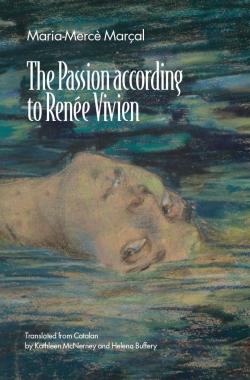 In this often poetic and lyrical novel by the revered Catalan poet Maria-Mercè Marçal, we are taken on a journey through the multiple, mobile and contradictory life, letters and loves of the fin-de-siècle Anglo-French writer, Pauline Tarn-Renée Vivien, as researched and reimagined by two principal narrators – a 1980s Catalan documentary film-maker Sara T. and a 1920s French archaeology scholar and museologist Salomon Reinach – alongside the voices of the various friends, relations, lovers, companions and servants who made her acquaintance at different moments in her life.
In this often poetic and lyrical novel by the revered Catalan poet Maria-Mercè Marçal, we are taken on a journey through the multiple, mobile and contradictory life, letters and loves of the fin-de-siècle Anglo-French writer, Pauline Tarn-Renée Vivien, as researched and reimagined by two principal narrators – a 1980s Catalan documentary film-maker Sara T. and a 1920s French archaeology scholar and museologist Salomon Reinach – alongside the voices of the various friends, relations, lovers, companions and servants who made her acquaintance at different moments in her life.
In the process, we are presented with a compelling reconstruction of the Belle Époque and interwar years in Paris, alongside other key sites in this transformational literary geography – Nice, Bayreuth, Switzerland, Istanbul, and the island of Lesbos – that include often dazzling evocations of other cultural figures and influencers of the age, from Zola to Pierre Louÿs and Remy de Gourmont, Liane de Pougy to Mathilde de Morny and Colette, not forgetting the central figure of Natalie Clifford-Barney, the ‘Amazone’.
Maria-Mercè Marçal:
The Passion according to Renée Vivien
Translation into English by Kathleen McNerney and Helena Buffery
Francis Boutle publishers
ISBN 9781916490659
Language: English
Format: paperback
Number of pages 354
£12
»» website Francis Boutle publishers
# new books
Maria-Mercè Marçal:
The Passion according to Renée Vivien
• fleursdumal.nl magazine
More in: - Book News, - Book Stories, Archive M-N, Archive U-V, Archive U-V, Émile Zola, Renée Vivien, Vivien, Renée
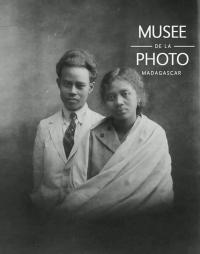
Matin Malade
Matin d’été, ô matin d’été,
bel et triste comme mon cœur,
tes arbres tremblent dans la clarté
en berçant mollement leur langueur.
Quel espoir de soleil virtuel,
paysage vert sans ramiers,
te nourrit de son leurre cruel
qui colore à peine tes palmiers
et te fait un frère adultérin
d’un sentiment lourd de chagrin
et plus lourd encor de soif d’azur
que du poids de l’épuisante nuit
qui m’a tendu son fruit bien mûr
mais gonflé de vénéneux ennui ?
Jean-Joseph Rabearivelo
(1901?/1903? – 1937)
Matin Malade (poème)
• fleursdumal.nl magazine
More in: Archive Q-R, Archive Q-R, Jean-Joseph Rabearivelo
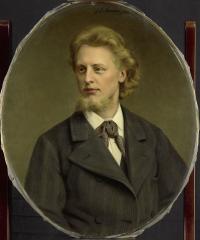
Die lach
Zooals wanneer opeens de zonneschijn
Door ‘t zwart der breede wolken heen komt breken,
En schittert in de tranen, die er leken
Van blad en bloem, als vloeiend kristallijn,
Zóó, dat het weenen lachen schijnt te zijn:
Zoo is, wat mij ontstemt, opeens geweken,
Mathilde! ontsluit úw mond zich om te spreken,
En doolt een glimlach om uw lippen, fijn: –
Doch van den lach is glimlach dageraad,
En klinkt uw lach, hoe drinken hem mijne ooren!
De vreugde vaart door pols en vezel rond. –
En met geloken oog zie ‘k uw gelaat,
Zoo zonnig: ‘k meen uw zilvren lach te hooren,
Wanneer ik roerloos wacht op de’ uchtendstond….
Jacques Perk
(1859 – 1881)
Die lach
• fleursdumal.nl magazine
More in: Archive O-P, Archive O-P, CLASSIC POETRY, Jacques Perk
1946. De jonge Franse Mathilde valt als een blok voor Amine, een Marokkaanse officier in dienst van het Franse leger.
Ze trouwen en vertrekken naar zijn familieboerderij in een klein dorpje, uren rijden van Rabat.
De liefde wordt constant op de proef gesteld maar houdt stand en ze krijgen een dochter, Aïcha, en een zoon, Selim.
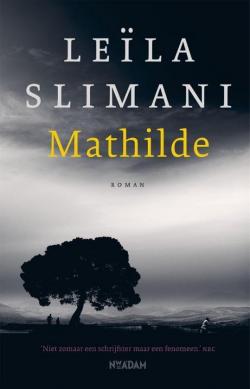 Mathilde vecht tegen de armoede en het heersende patriarchaat, soms met succes. Zo ontwikkelt ze zich tot dokter voor de plattelandsbevolking. Dit kleurrijke familieverhaal speelt zich af tegen de achtergrond van een steeds grimmiger wordende onafhankelijkheidsstrijd van protectoraat Marokko tegen Frankrijk, waarin Mathilde en Amine geen partij willen kiezen. Maar dan komt de dag dat de strijd ook hun afgelegen streek bereikt.
Mathilde vecht tegen de armoede en het heersende patriarchaat, soms met succes. Zo ontwikkelt ze zich tot dokter voor de plattelandsbevolking. Dit kleurrijke familieverhaal speelt zich af tegen de achtergrond van een steeds grimmiger wordende onafhankelijkheidsstrijd van protectoraat Marokko tegen Frankrijk, waarin Mathilde en Amine geen partij willen kiezen. Maar dan komt de dag dat de strijd ook hun afgelegen streek bereikt.
Mathilde is het eerste deel van de trilogie Het land van de anderen. Het verhaal is gebaseerd op Slimani’s eigen familiegeschiedenis, met een oma uit de Elzas, een opa uit Marokko, en een moeder die opgroeide op het arme boerenbedrijf van haar ouders maar toch de eerste vrouwelijke gynaecoloog van Marokko werd.
Leïla Slimani (Marokko, 1981) studeerde politicologie en handelswetenschappen in Frankrijk. Voor De perfecte oppas (eerder: Een zachte hand) won ze de Prix Goncourt. Het boek werd verfilmd onder de titel Chanson douce. Ook haar debuut In de tuin van het beest werd een wereldwijde bestseller. Seks en leugens, een bundel met openhartige interviews over de hypocriete seksuele moraal in Marokko, werd genomineerd voor de Prix Renaudot. In Marokko deed ze afstand van haar auteursrechten hierop om het boek betaalbaar te maken voor Marokkaanse vrouwen. Slimani wil een bijdrage leveren aan de ontwikkeling van een vrije samenleving met gelijke rechten voor vrouwen en mannen. Sinds 2017 is ze daarnaast persoonlijk vertegenwoordiger voor President Macron voor de Francofonie. Mathilde is het eerste deel van de trilogie Het land van de anderen. Het verhaal is gebaseerd op haar familiegeschiedenis en kwam in Frankrijk op één binnen in de bestsellerlijst.
Het land van de anderen – Mathilde roman
Auteur: Leïla Slimani
Serie: Het Land Van De Anderen
Taal: Nederlands
Bindwijze: Hardcover
22,99 euro
Druk 1
Verschijningsdatum: juni 2020
Afmetingen 21,6 x 14,4 x 3 cm
Aantal pagina’s: 356 pagina’s
Uitgever: Nieuw Amsterdam
Vertaald door Gertrud Maes Gertrud Maes
EAN 9789046827000
NUR code 302
Subtitel: roman
Categorieën: Literatuur & Romans/ Familieromans/ Literaire romans
# new books
Leïla Slimani
Mathilde roman
• fleursdumal.nl magazine
More in: - Book News, - Book Stories, Archive S-T, Leïla Slimani
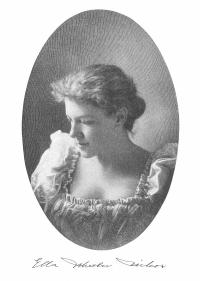
A Dream
In the night I dreamed that you had died,
And I thought you lay in your winding sheet;
And I kneeled low by your coffin side,
With my cheek on your heart that had ceased to beat.
And I thought as I looked on your form so still,
A terrible woe, and an awful pain,
Fierce as vultures that slay and kill,
Tore at my bosom and maddened my brain.
And then it seemed that the chill of death
Over me there like a mantle fell,
And I knew by my fluttering, failing breath
That the end was near, and all was well.
I woke from my dream in the black midnight –
It was only a dream at worst or best –
But I lay and thought till the dawn of light,
Had the dream been true we had both been blest.
Better to kneel by your still dead form,
With my cheek on your breast, and die that way,
Than to live and battle with night and storm,
And drift away from you day by day.
Better the anguish of death and loss,
The sharp, quick pain, and the darkness, then,
Than living on with this heavy cross
To bear about in the world of men.
Ella Wheeler Wilcox
(1855 – 1919)
A Dream (Poem)
• fleursdumal.nl magazine
More in: Archive W-X, Archive W-X, CLASSIC POETRY, Wheeler Wilcox, Ella

Nasrin Sotoudeh and her son
In prisons across Iran, there have been people who have tested positive for COVID-19. This raises grave concerns for prisoners in Iran, including human rights lawyer and prisoner of conscience Nasrin Sotoudeh. Take action and demand she is released now.
After two grossly unfair trails, Nasrin Sotoudeh, a prominent Iranian human rights lawyer, was sentenced to 38 years and six months in prison and 148 lashes because of her work defending women’s rights and protesting against Iran’s discriminatory and degrading forced veiling laws. Nasrin has dedicated her life to peaceful human rights works.
Now, in prisons across Iran, there have been confirmed cases of COVID-19. This raises grave fears that prisoners, like Nasrin, are at risk of contracting the virus. Prisoners are at particular risk because they are unable to take the same social distancing and hygiene measures as those outside of prison to protect themselves.
 Across Iran, prisoners have pleaded with officials to address overcrowded, unhygienic and unsanitary conditions that put them at greater risk of COVID-19 infections, raising alarms about the authorities’ failure to sufficiently protect prison populations from the spread of the virus. Some prisoners have been denied adequate medical care, leaving them at greater risk from the virus if contracted.
Across Iran, prisoners have pleaded with officials to address overcrowded, unhygienic and unsanitary conditions that put them at greater risk of COVID-19 infections, raising alarms about the authorities’ failure to sufficiently protect prison populations from the spread of the virus. Some prisoners have been denied adequate medical care, leaving them at greater risk from the virus if contracted.
Nasrin is among the hundreds of prisoners of conscience jailed in Iran. No one should spend a single day in prison for peacefully exercising their rights.
Call on the Supreme Leader of Iran to release Nasrin Sotoudeh immediately and unconditionally and for her sentences to be quashed without delay.
Iran: Free Nasrin Sotoudeh
Link: action amnesty international
• fleursdumal.nl magazine
More in: AUDIO, CINEMA, RADIO & TV, MUSEUM OF PUBLIC PROTEST, PRESS & PUBLISHING, REPRESSION OF WRITERS, JOURNALISTS & ARTISTS
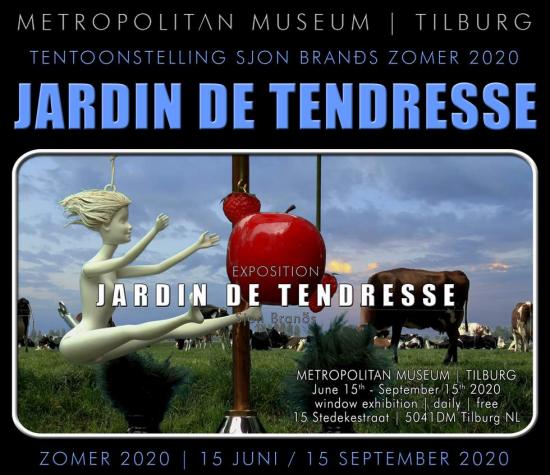
‘Jardin de Tendresse’ (Tuin der Tederheid) in het ‘Metropolitan Museum Tilburg’
De raamtentoonstellingen aan de Stedekestraat (‘Metropolitan Museum Tilburg’) laten deze zomer een ‘tuin der tederheid’ zien, waarmee het museum wederom reageert op deze donkere tijden van corona. Te zien vanaf vrijdagavond 12 juni 2020, Stedekestraat 15 te Tilburg.
De ‘anderhalvemetersamenleving’, ze is er dan toch van gekomen. Afstand als nieuwe normaal. Wie had dat ooit kunnen denken? Geen hand meer reiken om de ander vriendelijk te begroeten? Geen spontane omhelzingen meer met vrienden en vriendinnen? Geen knuffels meer aan kinderen en kleinkinderen? Niet meer zoenen op het zebrapad? Nooit meer vrijen op het strand? Waar leven we nog voor? Veiligheid voor alles? Echt waar? Gelamineerd door het leven en virtuele gemeenschap?
“Alles van waarde is weerloos,” schreef de dichter Lucebert, meteen gevolgd door de magistrale regel: “wordt van aanraakbaarheid rijk en aan alles gelijk!” Aanraking, hoe lang kan een mens zonder? Zonder af te glijden naar een troosteloos robottenbestaan? Waar gaan we heen?
Vandaar een tentoonstelling. Heeft kunst tenminste nog enige zin in deze donkere dagen. En dus nodigen wij u met alle plezier uit voor de expositie ‘Jardin de Tendresse’ (‘Tuin der Tederheid’) van Sjon Brands. Een speelse ‘exposition dansante’, uitgevoerd in bewegende assemblages van alledaagse gebruiksvoorwerpen en speelgoed. Een onbevangen feest van aanraking, tederheid en kwetsbaarheid, te zien in het ‘Metropolitan Museum Tilburg’. Welkom! Komt dat zien! Dag en nacht, zeven dagen in de week! Reserveren niet nodig.
◊ Dorith van der Lee
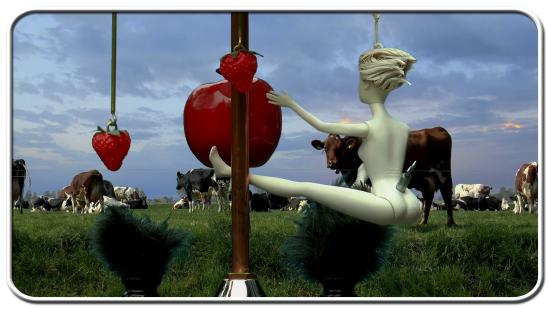
Raamtentoonstelling Sjon Brands:
‘Jardin de Tendresse’ (‘Tuin der Tederheid’)
vrijdag 12 juni t/m 15 september 2020
dagelijks, dag en nacht, toegang vrij
‘Metropolitan Museum Tilburg’
Stedekestraat 15, 5041DM Tilburg
website: www.metropolitanmuseum.nl
• fleursdumal.nl magazine
More in: - Objets Trouvés (Ready-Mades), Art & Literature News, Brands, Sjon, Exhibition Archive, Metropolitan Museum Tilburg, Sculpture, Sjon Brands, Surrealism, SURREALISM, Surrealisme, Theater van de Verloren Tijd
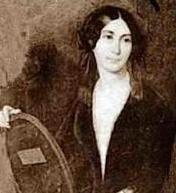
Amour de jeune fille
Ma mère, quel beau jour ! tout brille, tout rayonne.
Dans les airs, l’oiseau chante et l’insecte bourdonne ;
Les ruisseaux argentés roulent sur les cailloux,
Les fleurs donnent au ciel leur parfum le plus doux.
Le lis s’est entr’ouvert ; la goutte de rosée,
Sur les feuilles des bois par la nuit déposée,
S’enfuyant à l’aspect du soleil et du jour,
Chancelle et tombe enfin comme des pleurs d’amour.
Les fils blancs et légers de la vierge Marie,
Comme un voile d’argent, volent sur la prairie :
Frêle tissu, pour qui mon souffle est l’aquilon,
Et que brise en passant l’aile d’un papillon.
Sous le poids de ses fruits le grenadier se penche,
Dans l’air, un chant d’oiseau nous vient de chaque branche ;
Jusqu’au soir, dans les cieux, le soleil brillera :
Ce jour est un beau jour !… Oh ! bien sûr, il viendra !
Il viendra… mais pourquoi ?… Sait-il donc que je l’aime ?
Sait-il que je l’attends, que chaque jour de même,
— Que ce jour soit celui d’hier ou d’aujourd’hui —
J’espère sa présence et ne songe qu’à lui ?
Oh ! non ! il ne sait rien. Qu’aurait-il pu comprendre !…
Les battements du cœur se laissent-ils entendre ?
Les yeux qu’on tient baissés, ont-ils donc un regard ?
Un sourire, dit-il qu’on doit pleurer plus tard ?
Que sait-on des pensers cachés au fond de l’âme !
La douleur qu’on chérit, le bonneur que l’on blâme ,
Au bal, qui les trahit ?… Des fleurs sont sur mon front,
À tout regard joyeux mon sourire répond ;
Je passe auprès de lui sans détourner la tête,
Sans ralentir mes pas…. et mon cœur seul s’arrête.
Mais qui peut voir le cœur ? qu’il soit amour ou fiel,
C’est un livre fermé, qui ne s’ouvre qu’au ciel !
Une fleur est perdue, au loin, dans la prairie,
Mais son parfum trahit sa présence et sa vie ;
L’herbe cache une source, et le chêne un roseau,
Mais la fraîcheur des bois révèle le ruisseau ;
Le long balancement d’un flexible feuillage
Nous dit bien s’il reçoit ou la brise ou l’orage ;
Le feu qu’ont étouffé des cendres sans couleur,
Se cachant à nos yeux, se sent par la chaleur ;
Pour revoir le soleil quand s’enfuit l’hirondelle,
Le pays qu’elle ignore est deviné par elle :
Tout se laisse trahir par l’odeur ou le son,
Tout se laisse entrevoir par l’ombre ou le rayon,
Et moi seule, ici-bas, dans la foule perdue,
J’ai passé près de lui sans qu’il m’ait entendue…
Mon amour est sans voix, sans parfum, sans couleur,
Et nul pressentiment n’a fait battre son cœur !
Ma mère, c’en est fait ! Le jour devient plus sombre ;
Aucun bruit, aucun pas, du soir ne trouble l’ombre.
Adieux à vous ! — à vous, ingrat sans le savoir !
Vous, coupable des pleurs que vous ne pouvez voir !
Pour la dernière fois, mon Ame déchirée
Rêva votre présence, hélas! tant désirée…
Plus jamais je n’attends. L’amour et l’abandon,
Du cœur que vous brisez les pleurs et le pardon,
Vous ignorerez tout !… Ainsi pour nous, un ange.
Invisible gardien, dans ce monde où tout change.
S’attache à notre vie et vole à nos côtés ;
Sous son voile divin nous sommes abrités,
Et jamais, cependant, on ne voit l’aile blanche
Qui, sur nos fronts baissés, ou s’entrouvre ou se penche.
Dans les salons, au bal, sans cesse, chaque soir,
En dansant près de vous, il me faudra vous voir ;
Et cependant, adieu… comme à mon premier rêve !
Tous deux, à votre insu, dans ce jour qui s’achève,
Nous nous serons quittés ! — Adieu, soyez heureux !…
Ma prière, pour vous, montera vers les Cieux :
Je leur demanderai qu’éloignant les orages,
Ils dirigent vos pas vers de riants rivages,
Que la brise jamais, devenant aquilon,
D’un nuage pour vous ne voile l’horizon ;
Que l’heure à votre gré semble rapide ou lente ;
Lorsque vous écoutez, que toujours l’oiseau chante ;
Lorsque vous regardez, que tout charme vos yeux,
Que le buisson soit vert, le soleil radieux ;
Que celle qui sera de votre cœur aimée,
Pour vous, d’un saint amour soit toujours animée !…
— Si parfois, étonné d’un aussi long bonheur,
Vous demandez à Dieu : « Mais pourquoi donc, Seigneur ? »
Il répondra peut-être : « Un cœur pour toi me prie…
Et sa part de bonheur, il la donne à ta vie ! »
Sophie d’Arbouville
(1810-1850)
Amour de jeune fille
Poésies et nouvelles (1840)
• fleursdumal.nl magazine
More in: Arbouville, Sophie d', Archive A-B, Archive A-B
Thank you for reading Fleurs du Mal - magazine for art & literature